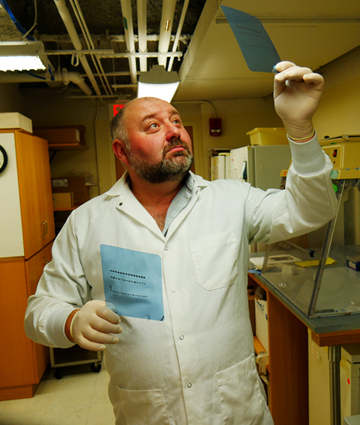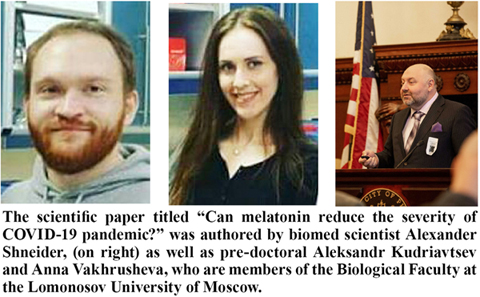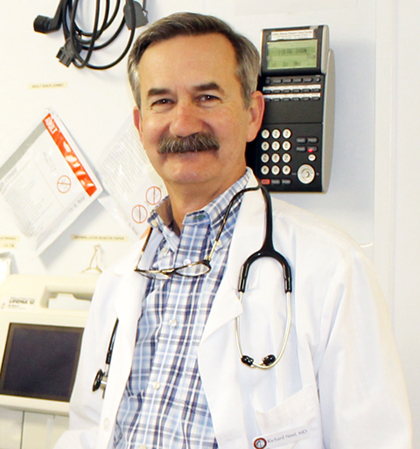As of this week, Dr. Richard Neel, MD, MPH at Little Alsace Urgent Care clinic in Medina County, Texas, has treated 14 COVID-19 patients very successfully. Though Dr. Neel has treated only a handful of patients, the results are intriguing.
Dr. Neel is a retired Air Force Colonel, who served as a Chief Flight Surgeon for many years as well as a personal physician for Ambassadors, General Officers and Senior State Department Personnel for years.
On September 11, 2001 he led an Air Force Emergency Team at the Pentagon.
He can cite many illnesses in which he has seen melatonin be effective.
Neel notes that melatonin helped during the anthrax attacks of 2001, when the now retired Air Force Colonel Dr. Neel was still working with a team of chemical and biological weapons experts in the US Pentagon.
“With pulmonary anthrax, by the time patients started showing symptoms it was often too late. But when given melatonin, it suppressed the toxins so much that the antibiotics could fight the infection,” Dr. Neel said.
He also cites eye-opening studies on melatonin.
“For example, studies of infants with sepsis have already shown that melatonin had a great effect on the rate of survival,” Dr. Neel said.
A 2001 study concluded in its abstract that “A total of 20 mg melatonin was administered orally in 2 doses…Three of the 10 septic children who were not treated died within 72 hours after diagnosis; none of the 10 treated with melatonin died.” (Effects of Melatonin Treatment in Septic Newborns, 2001) can be seen at https://pubmed.ncbi.nlm.nih.gov/11726736/
He notes a personal case as well.
“I personally have seen melatonin help someone recover from severe, life-threatening MRSA Pneumonia, to recover. This person was on a ventilator in very critical condition,” Neel said. “MRSA Pneumonia is highly lethal. He was dying. The family began giving him a high dose of melatonin divided among 4 doses a day by mouth, and he made a great recovery within a couple days.”
Dr. Neel states that melatonin’s anti-toxin properties make it a good candidate for fighting both bacterial or viral infections.
“I think that melatonin will be equally effective in viral infections. There is a 2014 study that suggests melatonin is effective against SARS,” Neel said. (Melatonin on oxidative stress resistance to bacterial, parasitic and viral infections: a review, published in a journal called Acta Tropica/Elsevier, 2014).
That study along with another 2004 study titled “Melatonin and Viral infections,” concludes that “the immunomodulatory, antioxidant, and neuroprotective effects of melatonin suggest this indole must be considered as an additional therapeutic alternative to fight viral diseases.” (Melatonin and viral infections, published by Journal of Pineal Research, 2004).
Neel states, “I have read a lot of studies on melatonin which are slowly trickling out there. There are just not enough clinical studies that have been done yet, especially in adults. There are just some things in medicine that don’t get the publicity it needs to get to the doctors who are out there practicing medicine.”
“The side effect profile of melatonin is so minimal, I feel confident in saying it’s not going to hurt anything for doctors and researchers to try it,” Neel said.“You can bet, if I get this COVID-19 virus, I am going to be taking melatonin.”
Treating COVID patients …
Dr. Neel first discussed the idea that melatonin could help treat the latest Coronavirus over a month ago.
“I believe doctors need to start using melatonin to treat patients now, today, to save lives,” Dr. Neel told The Devine News in an interview March 20.
A few weeks later, when COVID patients came to his clinic, he began doing exactly that.
Neel’s patients continue doing very well. The three most severe patients who had high fevers and deep worsening cough, made a remarkably fast recovery.
“My first COVID patient, who was in his late 40’s, had several days of really high fever that wouldn’t break with Tylenol, a dry non-productive cough, worsening shortness of breath, and loss of taste and smell. His symptoms started on a Sunday, and he first talked to me on Wednesday afternoon,” Dr. Neel said.
“He began treatment that night, taking a high dose of melatonin around 8 pm, and he was fever-free when he woke up the next morning,” Neel said. “Then he began taking a high dose of Vitamin C as well as continuing melatonin divided in 4 daily doses and continued improving, getting his sense of smell and taste back, and his cough got better and better on the 3rd and 4th day.”
“These patients all showed tremendous improvement within 12-24 hours of beginning melatonin,” Dr. Neel said. “Maybe it won’t work for everyone. Maybe it will. But it’s got an excellent safety profile, and based on what I’ve seen, you’ll know very fast if it’s working.”
“There are so many people out there on ventilators, who are very sick or dying, and it is not going to hurt anyone to add melatonin to whatever their current treatment is,” Dr. Neel said. “Melatonin is sublingual so it will dissolve on the tongue, and that is another great thing about it.”
Five of his patients had high fevers, body aches, and a cough, while at least 2 of those were also having shortness of breath.
“It is impossible to tell if any of the more seriously ill patients I treated would have progressed to needing a ventilator, but that is why more study with seriously ill patients is needed now,” Dr. Neel said.
Many of the other patients treated by Dr. Neel were positive for COVID, and began treatment very early due to knowing they had direct exposure; these patients were mainly asymptomatic and continue to be asymptomatic after beginning treatment.
“I have been contacted by several doctors all over the country from California to Florida, Toronto, and even a doctor from Brazil,” Dr. Neel said. He also received a phone call from Italy hospital physicians who are interested in doing a study on melatonin’s ability to fight COVID-19.
Devine News interviews with Dr. Neel on melatonin and COVID-19 have been read by close to 50,000 people. on www.DevineNews.com, with people from all 50 states across the US, as well as many readers across the world, including readers in Europe, Canada, South America, Africa, Russia, United Kingdom, Italy, Philippines, Germany, France, Mexico, Australia, Ireland, India, Africa, Pakistan, Fiji and more. These stories have been read by people in every continent in the world, excluding Antartica.
As Medina County Health Unit Director Patricia Mechler stated, “Dr. Neel is well-respected in our community, and I have seen his patients taking melatonin do well.”
Dr. Neel is now the co-owner of The Little Alsace Urgent Care Clinic in Castroville and Uvalde, TX.
He was recently appointed as the City of Devine Public Health Authority.
Dr. Neel can cite many studies on the safety and efficacy of melatonin to treat a virus like this. Among many of those scientific and medical papers is this one in the article below, supporting the science behind the idea that melatonin can help fight covid-19 pandemic.

Biomed scientist believes melatonin can help fight COVID and post-infection complications
We reached out to biomedical scientist, Alexander Shneider, the senior author of a scientific paper titled, “Can melatonin reduce the severity of COVID-19 pandemic?” In a short interview with The Devine News this Monday, May 4, Shneider discussed the science behind the idea.
“My wife is a registered nurse and every morning she is coming to the front lines and fighting for her patient’s lives,” Shneider said, explaining that he felt like writing this research paper was something he had to do, as he’s sees melatonin as having such enormous potential to save lives and prevent further complications of COVID-19.
“Many people when they hear ‘melatonin’–they only think about sleeping,” Shneider said. “But molecules often have more than one function in the body, some of which are completely unrelated, and this is the case with melatonin.”
“Let’s look at what this coronavirus does–it creates oxidative stress,” Shneider said. “Well melatonin is the most effective anti-oxidant in nature.”
There is also an “explosion” of Oxygen free radicals (bad guys) produced in the body during the infection, and melatonin is a great scavenger.
“One melatonin molecule scavenges and neutralizes 10 oxygen radicals (the bad guys). Most other anti-oxidants will scavenge and neutralize only one radical.”
He puts it in layman’s terms…..
“If we say this virus comes to the lungs and puts it on fire (oxidative stress), we’ll say melatonin works as an extinguisher (or a fireman), putting the fire out, because it’s the most efficient anti-oxidant,” he explains.
When it comes to the huge amount of oxygen free radicals produced during this deadly virus, “Let’s imagine that melatonin anti-oxidants are the policemen, and the oxygen radicals are the hoolligans (or bad guys). The policeman (melatonin) can catch 10 hoolligans, compared to other anti-oxidants who can only catch 1 hoolligan.”
Secondly, he believes that melatonin could be an important tool in preventing post-infection complications.
“What is the most dangerous thing about this coronavirus? Is it the disease itself? I don’t think so. It’s the potential complications. We saw it with SARS in 2002-2003 and also with MERS,” Shneider said.
“As a Ph.D. student I was taught that a virus actively kills our cells during the course of the infection…..But now I know a virus is more like a provoking bully, a bully who continues to provoke cells in our lungs and our respiratory tract to commit suicide……We analyzed the molecular mechanism, how the virus does it, and matched it with scientific databases. Then, came to conclusion that melatonin can block the process that promotes suicide in lung cells.”
“I believe melatonin will be super useful in preventing or reversing severe symptoms of an infected person, before the disease develops to a dangerous level. I am also greatly concerned that even those people, who recover pretty painlessly from this virus today, may develop post-infection complications such as lung fibrosis later on. I believe we should use melatonin to reduce this risk.”
“The proper way to go about this would be clinical trials….You would get a limited group of COVID patients and give them melatonin, and three years down the road, you would say ‘Wow! Look at how it protected them from developing fibrosis, compared to the others who were not treated with melatonin.’”
“But, that will be useless because you don’t have a time machine,” Shneider said. “The medical community has a dilemma here…..To not give or to give an over-the counter, safe medication that may prevent this life-threatening disease and life-threatening complications later on for hundreds of thousands of people.”
“Research has been conducted for long periods of time, showing that even with high doses, melatonin is reported to have a high level of safety,” Shneider adds.
Towards the end of our interview, he added “I am a scientist. I am not a salesman, so I am not here to convince anyone of anything. I just want to share the knowledge, the idea, the information, and let the people and the doctors decide for themselves.”
In conclusion, the research paper states, “The history of biomedical science, public health, and medical practice knows many examples of mental inertia and the price it cost in lives.” In addition to conventional research strategies, “we propose to immediately inform doctors, nurses, healthcare providers, and the general public of the potential benefits of melatonin. Extraordinary situations require out-of-the-box modus operandi. The lack of timely action is, in and of itself, an action.”
The full research paper can be viewed at https://www.tandfonline.com/doi/citedby/10.1080/08830185.2020.1756284?scroll=top&needAccess=true
Alexander Shneider, Ph.D., has over 25 years experience working with antiviral vaccines, anti-cancer biologicals, and lately with biologicals against diseases of chronic inflammation. He is also the CEO of a BioTech company called Curelab Oncology based in Massachusetts. He also serves as a Senior Research Fellow of molecular biology at University of Ariel, Israel; editorial board member for journals including Aging and Cell Cycle, and editorial board of International Reviews of Immunology.

Highlights from the new scientific paper
The following are some highlights from the scientific paper titled, “Can melatonin reduce the severity of COVID-19 pandemic?” authored by biomed scientist Alexander Shneider, as well as pre-doctoral Aleksandr Kudriavtsev and Anna Vakhrusheva, who are members of the Biological Faculty at the Lomonosov University of Moscow.
The research paper was published online April 29,2020 by the journal “International Reviews of Immunology.”
-“Elderly have reduced level of melatonin- The effect of SARS-CoV-2 on humans is clearly age-related. So far, very few deaths from COVID-19 have been recorded in people under the age of 20, while the elderly have an excessively high mortality rate. We hypothesize that, at least partially, the increased sensitivity to coronavirus in the elderly is due to their reduced level of melatonin.”
-“Coronavirus activates inflammasome and causes inflammation, which melatonin reduces-Researchers believe that SARS-CoV-2 causes severe lung pathology by inducing pyroptosis [32], a highly inflammatory form of programmed cell death [33]….Thus, it is necessary to inhibit pyroptosis by acting on NLRP3, preferably immediately in the lungs. The mechanisms of NLRP3 inhibition have been studied [38], and melatonin reported as NLRP3 inflammasome inhibitor [39]. On the model of bacterial pneumonia, LPS-induced ALI mouse model, it was shown that melatonin successfully inhibits pneumonia through interfering with NLRP3 inflammasome, protecting macrophages from pyroptosis [40]. Other publications also demonstrate that melatonin may be an effective inhibitor of pyroptosis and pathologies associated with it [41–46].”
-“Melatonin can be utilized in combinations with drugs and treatments- Chloroquine and hydroxychloroquine are viewed today as the most promising anti-COVID-19 drugs [71,72,78,79]….even the research on the anti-malaria effect of melatonin antagonists noticed that high doses of melatonin are beneficial for malaria treatment because they inhibit programmed cell death and oxidative stress [80]. Thus, applying melatonin as an adjuvant to chloroquine and hydroxychloroquine treatments of COVID-19 may reduce the necessary doses, and thus toxicity, of these agents [81]. ”
-“Can melatonin prevent the main danger, post-COVID-19 lung fibrosis?- Although it is not yet possible to predict what the actual mortality due to respiratory failure and the 5-years survival will be for COVID-19, this was a common danger for most patients during the previous SARS-CoV-1 epidemic [94]…….The role of melatonin antioxidant properties in the prevention of COVID-19 post-infection complications should be addressed with no delay. Melatonin’s ability to protect patients from pulmonary fibrosis through the Hippo/YAP pathway has already been shown [99]. Considering that millions of people can be infected with COVID-19, while only several tens of thousands were with SARS-CoV-1, applying melatonin to prevent pulmonary fibrosis may be even more important than mitigating the acute SARS-CoV-2 infection per se.”
-“Can melatonin harm?-Anything can harm if used inappropriately, and/or if the population is large enough there will always be people oversensitive to any factor. However, the acute toxicity of melatonin was reported to be very low [105–107]. Even high doses, such as 1–6.6 g/day administered for 30–45 days, demonstrated no recorded toxicity. Also, we are not aware of any convincing human data demonstrating chronic melatonin toxicity. In fact, no toxicity was reported in phase II clinical trials of 1400 women receiving 75 mg of melatonin nightly for 4 years [108]….”
Read the full paper at https://www.tandfonline.com/doi/citedby/10.1080/08830185.2020.1756284?scroll=top&needAccess=true
This article is not a substitute for medical advice. It is for your information only. Please consult your doctor.
By Kayleen Holder
THE DEVINE NEWS
Editor
